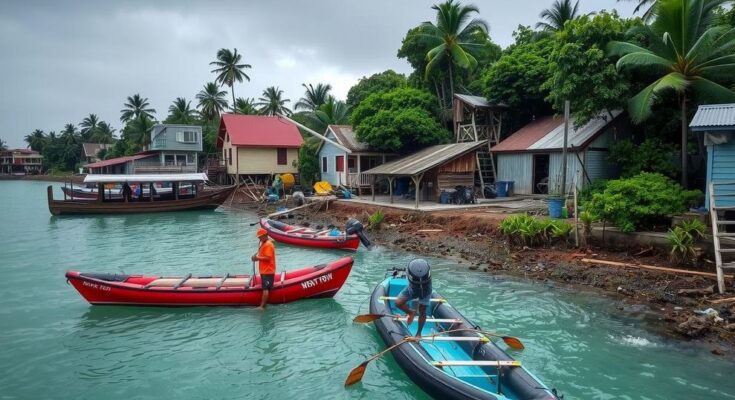A rescue operation has commenced in Mayotte after Cyclone Chido, the most destructive storm in 90 years, wreaked havoc across the island. Over 100 soldiers are providing aid, while essential supplies are being dispatched from Reunion Island to assist affected individuals facing critical shortages of food, water, and electricity.
In Mayotte, a French island territory located in the Indian Ocean, a rescue operation has been initiated following the devastating impact of Cyclone Chido, which has been described as the worst cyclone to affect the region in over 90 years. With winds exceeding 140 mph (225 km/h), the cyclone caused extensive destruction, damaging homes, power lines, roads, as well as critical infrastructure such as the primary airport and hospital. The most vulnerable populations, particularly those residing in poorly constructed shelters, have experienced severe devastation as their homes, primarily made of metal sheeting, were destroyed by the cyclone’s fierce winds.
A flight carrying essential supplies for emergency shelters has reached the island; however, many residents are still in dire need, lacking basic necessities such as food, water, electricity, and internet connectivity. To assist in the response efforts, over 100 French soldiers have been deployed, with an additional 160 soldiers scheduled to arrive shortly. The French government has announced that relief supplies and equipment are on their way from Reunion Island, another French overseas territory.
Despite its distance of nearly 5,000 miles from Paris, Mayotte is governed by French laws and regulations, which underscores France’s commitment to providing support to its territories. The French President, Emmanuel Macron, is expected to convene an emergency meeting to address the ongoing situation. In meteorological terms, Cyclones are akin to hurricanes and typhoons, differing only in their regional nomenclature. They typically form over the South Pacific and Indian Oceans, with the cyclone season in Mayotte running from December through March.
Cyclone Chido’s unprecedented impact on Mayotte highlights the vulnerabilities of this French territory, where a significant portion of the population lives under challenging conditions. The region, consisting of two main islands—Grande-Terre and Petite-Terre—has a diverse ecosystem and is subjected to storm threats during certain times of the year. Cyclones in this region embody a meteorological phenomenon characterized by their capacity to incur catastrophic damage, as reflected in the recent cyclone’s aftermath. As the effects of climate change increasingly influence storm patterns, regions like Mayotte may face heightened risks.
In summary, the rescue efforts in Mayotte following Cyclone Chido reveal the urgent need for humanitarian assistance in the wake of catastrophic natural disasters. With widespread destruction impairing infrastructure and displacing vulnerable communities, the coordinated response from the French government and military plays a crucial role in restoring order and providing essential aid. These events serve as a reminder of the ongoing challenges faced by island territories, especially during cyclone season, and the importance of preparedness and resilience in the face of future storms.
Original Source: www.bbc.co.uk




